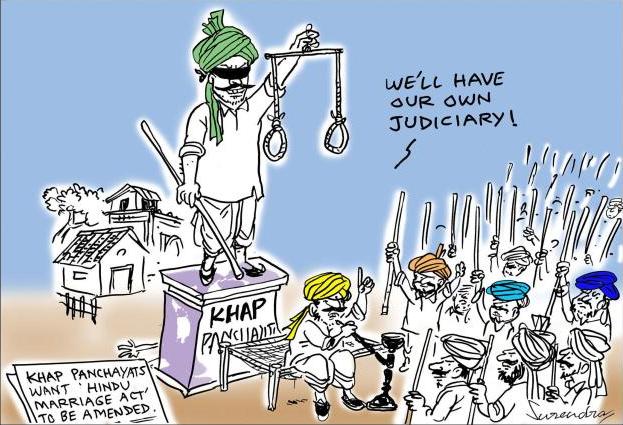- To adequately address the claims and ensure justice, Khap leaders are urging for prompt action and the arrest of a Minister suspected of sexual harassment of wrestlers.
- The khap leaders have decided to organise a delegation to meet with President in order to raise their demands and gain support for their cause.

Recognising Khaps
- Khaps are gotra- and region-based social groups: Khaps are social organisations that are mostly centred on gotras (paternal lineage clans) and areas.
- What are their names? They get their names from the number of villages/clusters of villages they represent or the gotras they belong to.
Khap classifications
- Khaps from the Gotras: They wield authority over villages governed by the gotras they represent.
- Khaps has power over a certain territory ranging from a few villages to several hundred villages.
Khap characteristics
- Traditional conflict resolution: Historically, khaps served a variety of purposes, including mediating disputes between families and villages, enforcing religious norms, and protecting the territory from external incursions.
- However, their role in protecting against invasions has mostly faded, and they now primarily focus on dispute settlement and enforcing respect to social and religious conventions.
- Leadership and succession: When it comes to leadership and succession, Khaps lack a defined organisational framework. While the office of khap president or leader was once strictly hereditary, this is no longer the case.
Functions of Khaps
- Dispute Resolution: Khaps have long played an important role in resolving disputes, both between families and between villages. They serve as mediators, attempting to reach agreements that are agreeable to all parties concerned.
- Maintaining Social and Religious practises: Khaps are in charge of sustaining social and religious practises in their communities. They ensure that cultural practises, rituals, and traditions are observed and perpetuated.
- Khaps exert some type of social governance in their distinct spheres of influence. They enforce communal norms and standards, encouraging community social cohesiveness and peace.
- Community Welfare: Khaps frequently participate in activities that benefit the community. This could involve organising social and cultural events, assisting in times of crisis, and aiding community development projects.
- Advice & direction: Khaps provide community members with advice and direction. Individuals can seek advice from khap leaders on a variety of personal, social, and legal issues.
- Representation and Advocacy: Khaps serve as community representatives, advocating for their interests and concerns. To solve community-specific concerns, they may work with local authorities, government officials, and other stakeholders.
- Khaps play an important role in preserving the ancestry and genealogy of families within their communities. They keep records and are aware of family links, which can be useful for social and marital norms.
- Protection of Community Interests: Historically, khaps also had a role in protecting the community from external threats, such as invasions. While this function is essentially obsolete today, khaps may sometimes gather together to discuss issues affecting their communities’ common interests.
Khaps’ Political Power and Influence
- Large affiliated population: Khaps get authority from their connections to a large number of people who identify with specific gotras or live within their jurisdiction.
- Khaps gain legitimacy through serving as pressure groups and mobilising people around political problems. Their capacity to mobilise their members and exert pressure on authorities makes them powerful political players.
- Khaps actively participate in protests and movements, amplifying the voices of the dissatisfied and lending weight to their demands.
- Farmer agitation involvement: Khaps played an important role in the farmer agitation against disputed farm laws, which contributed to the movement’s victory.
- Khaps have emerged as critical political players in north Indian politics, with political parties seeking their assistance due to their vast influence and large support base.
- Individual political success is limited: While khaps wield political power collectively, individual khap leaders have various degrees of success in their personal political careers.
Khaps Problems
- Khaps put limitations on inter-caste and intra-gotra marriages, limiting personal freedom and sustaining caste-based distinctions.
- Gender inequality: Khaps frequently discriminate against women, imposing patriarchal norms and limiting their rights and options.
- Khaps have been linked to honour killings, in which people are slain for marrying against the wishes of their families or communities.
- Lack of legal power: Despite their lack of legal authority, khaps apply social pressure and enforce punishments, infringing on individual rights.
- Lack of transparent leadership selection and decision-making processes: Khaps lack transparent leadership selection and decision-making processes, which leads to disagreements and favouritism.
- Khaps encourage exclusion and prejudice based on caste, gotra, or other social distinctions.
- Interference in legal procedures: Khaps intervene with legal proceedings, questioning the judicial system’s authority.
The Importance of Khap
- Resolving local issues: Khaps are useful in rural regions for resolving local social disputes and offering a conflict resolution process.
- Maintaining social and cultural customs: Khaps help to preserve cultural identity through upholding social and cultural customs.
- Community cohesion and solidarity: Khaps promote community cohesiveness by providing a forum for collaborative action and the resolution of common concerns.
- Khaps serve as advisors and guides to members of the community on personal, social, and legal issues.
- Advocating for community interests: Khaps campaign for their communities’ needs and aspirations, ensuring that their voices be heard.
- Sense of identification and belonging: Khaps help people feel a sense of identity and belonging by connecting them to their ancestors.
- Social welfare and support: Khaps participate in social welfare and community development initiatives.
- Political clout: Khaps wield political clout, and parties seek their support because of their enormous support base and mobilisation powers.
@the end
Overall, a balanced approach is required to recognise and honour Khaps’ beneficial aspects while correcting their flaws and achieving a more inclusive and equal society.
Source: https://www.indiatoday.in/india/north/story/what-is-khap-panchayat-118365-2012-10-10
